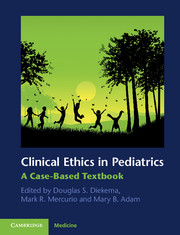Book contents
- Frontmatter
- Contents
- Contributors
- Preface
- Section 1 Core issues in clinical pediatric ethics
- Section 2 Ethical issues at the beginning of life: perinatology and neonatology
- Section 3 When a child dies: ethical issues at the end of life
- Section 4 Ethical issues posed by advances in medical technology and science
- Section 5 Children, public health, and justice
- Section 6 Special topics in pediatric ethics
- 37 Industry representatives, gift-giving, and conflicts of interest
- 38 Patient participation in medical training
- 39 Boundary issues in pediatrics
- 40 The impaired, incompetent, or unethical provider
- 41 Ethics committees and consultation services
- Index
- References
41 - Ethics committees and consultation services
from Section 6 - Special topics in pediatric ethics
Published online by Cambridge University Press: 07 October 2011
- Frontmatter
- Contents
- Contributors
- Preface
- Section 1 Core issues in clinical pediatric ethics
- Section 2 Ethical issues at the beginning of life: perinatology and neonatology
- Section 3 When a child dies: ethical issues at the end of life
- Section 4 Ethical issues posed by advances in medical technology and science
- Section 5 Children, public health, and justice
- Section 6 Special topics in pediatric ethics
- 37 Industry representatives, gift-giving, and conflicts of interest
- 38 Patient participation in medical training
- 39 Boundary issues in pediatrics
- 40 The impaired, incompetent, or unethical provider
- 41 Ethics committees and consultation services
- Index
- References
Summary
Case narrative
Baby Zelda’s 18-year-old mother had complications during pregnancy that included a urinary tract infection, prolonged ruptured amniotic membranes, fetal distress, and amnionitis. Baby Zelda was born prematurely at 25 weeks gestational age and was resuscitated and ventilated at birth. She needed antibiotics, transfusions, vasopressors, and analgesia. About a week after birth she developed necrotizing enterocolitis. Surgeons found an irreversibly non-functioning bowel with such extensive intestinal involvement that surgical resection could neither extend nor improve the quality of her life. Her pain, manifested in grimaces and writhing movements, was escalating despite aggressive pain management, and peritonitis developed. All members of her care team favored shifting to comfort care. They recommended that invasive and uncomfortable medical interventions be forgone and all therapies serve a single purpose – to keep Baby Zelda as comfortable as possible for the duration of her short life. Baby Zelda’s bedside nurses agreed that her pain was “as bad as anyone can remember for a patient in this NICU” (McCormick & Woodrum, 2008, p. 22). Baby Zelda’s young parents, self-described as “poor and used to living a simple rural life,” were stunned and believed Zelda would improve if aggressive medical treatment continued. As often happens, the providers continued life-sustaining treatment for several days to give Zelda’s grieving, devastated parents time to come to terms with the tragedy. When Zelda’s parents were unwavering in their insistence on continuing aggressive treatment indefinitely, the care team requested an ethics consultation (case, described above, comes from McCormick & Woodrum, 2008, p. 26).
What is an ethics consultation?
An ethics consultation is a service provided to patients, surrogates, parents, health care providers, and others involved in patient care to address “uncertainty or conflict regarding value-laden issues that emerge in health care” (Task Force on The Core Competencies for Healthcare Ethics Consultation, 2011). The goals of ethics consultation are to: (1) identify and analyze the ethical issues in clinical cases, policies, or practices; (2) facilitate conflict resolution in the interest of achieving ethically sound consensus; and (3) give those involved tools and information to assist them in addressing ethical issues in health care (Task Force on The Core Competencies for Healthcare Ethics Consultation, 2011).
- Type
- Chapter
- Information
- Clinical Ethics in PediatricsA Case-Based Textbook, pp. 235 - 239Publisher: Cambridge University PressPrint publication year: 2011



